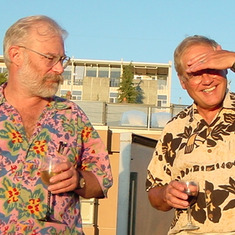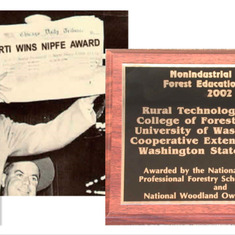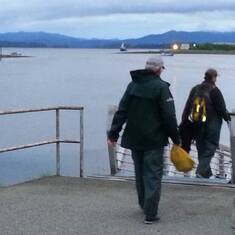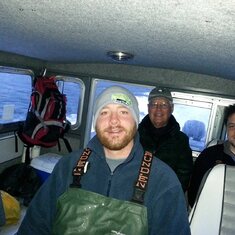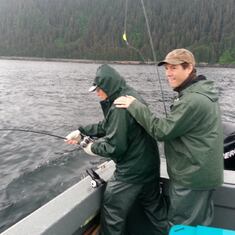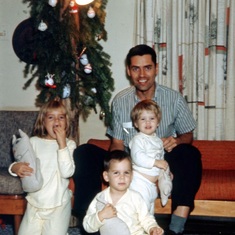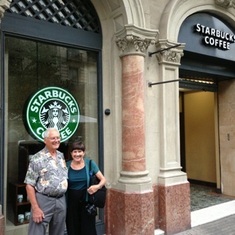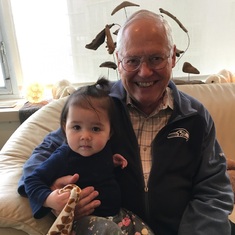Thoughts on the Passing of Bruce Lippke
I’ve often thought of what made Bruce Lippke so special. What made him a solid family man? an excellent manager? an excellent scientist? and a mentor to people such as I who was already mid-way through my life when I met Bruce--but learned an incredible amount from him? I learned how to enjoy life more, how to manage better, and how to be a better scientist.
1. As a scientist, Bruce had a “nerd-like” interest and excitement in examining science—these led to an admirable creativity. He had an infectious laugh that was almost a giggle when he discussed the subtleties of a scientific concept. And, he enjoyed delving deeply into the science.
2. He also had a hands-on approach to delving deeply into the science. On several occasions, Bruce and I would discuss a scientific issue or analysis just before quitting time on Friday. On Monday morning, he would burst excitedly into my office and say: “Remember what we talked about Friday? I spent the weekend analyzing some data and look what I found… And show me a pile of graphs and charts.”
3. He was extremely quick to pick up a new idea and grasp its nuances. From there, he would move quickly into the question of “How do we make use of this.” And, then stimulate the creativity for all of us by these questions.
4. He would equally comfortably lead on an idea or assist if someone else was leading. And, he would work tirelessly either as the leader or the follower. Consequently, one never felt any hesitation that he would steal or distort someone else’s ideas.
5. With people, he separated issues and personalities. He may strongly disagree with a person on one issue (and he would be a formidable opponent), but not hold a grudge beyond that topic—whether he won or lost. And, he could agree and be a strong supporter on another issue. Consequently, we all felt comfortable expressing our frank opinions around him.
6. He could be a subtle or blatant supporter of an issue, depending on what was needed. I remember once when our LMS (Landscape Management System) computer model crashed in the middle of a demonstration, we were all embarrassed and dejected. Suddenly, Bruce started talking about his early work launching rockets at Cape Canaveral (before Cape Kennedy). We were completely baffled why he brought it up until he started talking about rockets misfiring and chasing the news reporters off of their viewing stand. (The message was, of course, keep going; these glitches happen everywhere.)
7. Despite his enthusiasm that seemed at times almost childish, he could be very subtle and effective in understanding nuances of a negotiation and reaching a positive outcome. And, he could recognize, defer to, and support someone else working with him who had the “golden touch” in a particularly situation.
8. To Bruce, there seemed to be no ego involved in his work. The focus was on providing positive, useful outcomes—and, by the way (he used to frequently say “by the way”) let’s enjoy ourselves while doing it.
9. By focusing on the issues and scientific/technical questions, Bruce engaged everyone much more than had he tried to focus on the people themselves. I’ve wondered if he was conscious of this as a technique or if this focus was just part of his overall engaging personality.
10. I once asked Bruce if he ever got discouraged. He answered, laughingly: “Only if I run out of alternative courses of action.” And, of course, running out of alternatives was very difficult for such a creative person.
11. Bruce had a very sincere concern about the environment and wanted to do things to make it better. But, he did not endorse bandwagons or fads. Rather, he looked for truly scientific and technical solutions that would make a real difference.
I am sure the above list could be much longer. All of the behaviors described above were wrapped into such a positive, sunny disposition that it is difficult to recognize how strongly he motivated those around him to positive ends.
I am very glad and fortunate to have known and worked with Bruce. Although I felt fulfilled before I met him, he made my life even happier and more interesting. I hope I have captured at least a part of made Bruce special, because if we could bottle it and give it to everyone, the world would be a better place.
--Chad Oliver
(2002-2020) Pinchot Professor Emeritus,
School of the Environment, Yale University
(1975-2002) Professor,
College of the Environment, University of Washington


